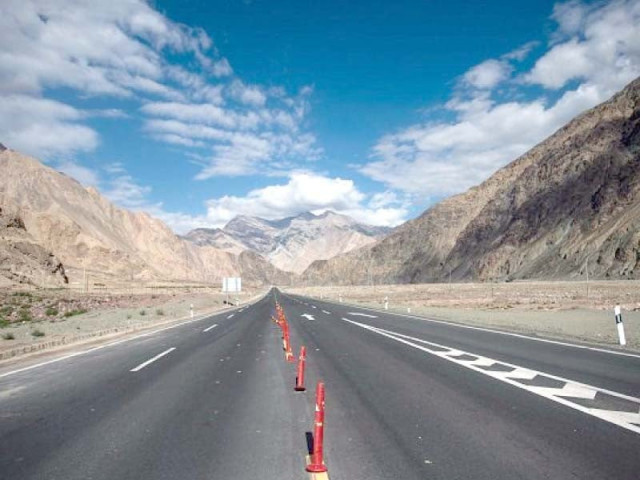Govt clears $2b CPEC road project
Thakot-Raikot Karakoram highway section approved ahead of PM Sharif’s visit to Beijing next week

The government on Thursday approved the construction of another road project under the China-Pakistan Economic Corridor (CPEC) at a cost of $2 billion, paving the way for the signing of its framework agreement during Prime Minister Shehbaz Sharif’s visit to Beijing next week.
The Central Development Working Party (CDWP), the body mandated to recommend mega schemes for higher forum approval, sanctioned the construction of the Thakot-Raikot 241-kilometer section of the Karakoram Highway, according to an announcement by the Ministry of Planning after the meeting.
The CDWP approved the project at a cost of Rs567.5 billion or $2 billion, with the direction that the price tag should be further reduced by rationalising overhead expenses.
The Karakoram Highway was originally built with the help of China about 50 years ago, and due to the difficult terrain, scores of people died during the construction phase. A fully functional all-weather Karakoram Highway is critical for China-Pakistan economic and commercial relations. This is the third major road infrastructure project both nations aim to build under CPEC, following the Multan-Sukkur motorway and the Havelian-Thakot section of the Karakoram Highway.
The Deputy Chairman of the Planning Commission, Dr Jehanzeb Khan, chaired the CDWP meeting. Khan’s position in the government may further be strengthened after the budget due to certain administrative changes that the PM Sharif government is considering implementing.
Pakistan and China have already agreed to complete the remaining missing link of over 800 kilometres of the Karakoram Highway during the 10th Joint Cooperation Committee meeting. The 241-kilometer missing link is planned to be constructed with a Chinese soft loan, according to Ministry of Planning officials.
Out of the $28 billion investment under CPEC so far, $6.7 billion has been made in infrastructure projects.
Last week, Pakistan requested Beijing to fund nine more projects under CPEC worth $17 billion, including the road missing link.
However, the project has been cleared without its economic and financial analysis. The planning ministry pushed the project approval in haste, as it received the project documents just a day before the CDWP meeting. China has prepared the joint feasibility study of the project and shared its main findings with Pakistan last month. However, Chinese authorities have not yet provided an item-wise rate analysis of all the items, nor the backup of quantities for their internal working, according to officials of the Ministry of Communication.
Planning Minister Ahsan Iqbal had directed the National Highway Authority (NHA) to conduct a third-party validation of the project cost from a Pakistani consultant. But the CDWP was informed that it may take two months to hire a consultant and another three months to validate the findings of the Chinese report.
Since the PC-I is a prerequisite for signing the framework agreement during the premier’s visit, the NHA said the project is reasonably priced, but the bidding would take place only after the third-party validation, according to communication ministry officials. The CDWP cleared two projects worth Rs609.5 billion on Thursday, including the road scheme. The Executive Committee of the National Economic Council (ECNEC) will now take up the issue for its final endorsement.
The PC-I of the project envisages the upgrading, improvement, and realignment of the KKH road from Thakot to Raikot Bridge. The project includes the upgrading of the KKH from Thakot to Dasu with a bypass road, exclusive relocation of the KKH at Dasu Dam being done by WAPDA, upgrading of the existing road from Sazin to Thor Nullah & R-1, and new construction of the KKH after Basha. The project will be completed in five years, said the planning ministry.
If China agrees to finance the project, it will be completed on an engineering procurement and construction modality, and the approval of the federal cabinet will also be required. There were also issues of financing the project from the Public Sector Development Programme (PSDP), as the NHA’s financing requirements for ongoing projects have already gone up to Rs1.7 trillion. The country also needs Rs250 billion annually if it wishes to complete the Mainline-I project of CPEC in the next eight years.
The CDWP also approved increasing the cost of the Golden Gol Hydropower Project, which has a 108-megawatt generation capacity. The price was increased to Rs42 billion. The project is being funded through the OPEC (Organisation of the Petroleum Exporting Countries) Fund for International Development, the Saudi Fund for Development, the Kuwaiti Fund for Arab Economic Development, and the United States Agency for International Development (USAID).
The main objective of the project is the construction of a 108 MW hydropower project with an annual energy output of about 476 GWh.
Published in The Express Tribune, May 31st, 2024.
Like Business on Facebook, follow @TribuneBiz on Twitter to stay informed and join in the conversation.


















COMMENTS
Comments are moderated and generally will be posted if they are on-topic and not abusive.
For more information, please see our Comments FAQ